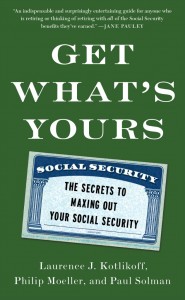Social Security….you think you know it (and how it’s so, so straightforward and easy), and then you read a book like Get What’s Yours, The Secrets To Maxing Out Your Social Security and quickly realize how little prep work you’ve done. We were lucky to sit down (via email) with two of the authors, Philip Moeller and Paul Solman, and find out the ugly truth about well….how ugly Social Security strategies can really be if you aren’t careful.
Joe: Why did you decide to write this book? How did the project begin?
Paul Solman: Larry claims it was my idea; I maintain it was Larry’s. But regardless, the motivation was the same: demystification. My career on public television has been devoted to demystifying business, economics and finance. Larry has for years been perfecting the country’s best Social Security software to demystify benefit decisions. The collaboration seemed natural.
The project began when Larry first alerted me to benefits I was unaware of. When I published a post of his about “Social Security Secrets” on my PBS economics website, “Making Sen$e,” the online response was so substantial, I asked Larry to write a column, answering reader questions. There were so many questions, the column immediately became a weekly feature. July 30 will mark its third anniversary.
Phil Moeller: I met Larry about 10 years ago after he had written The Coming Generational Storm: What You Need to Know about America’s Economic Future with an old friend of mine, Scott Burns. When he approached me to partner with him and Paul, I was interested. After a meeting with both of them, we decided to do the book together.
Joe: Chapter One talks about co-author Paul Solman and figuring out which age to take social security. Well, Paul said he had it all figured out, but did he?
PS: Absolutely not. Well, let me qualify that. My wife and I did have the book’s most important lesson figured out: that we should wait until 70 before taking our own benefits, because Social Security is old age insurance against outliving one’s savings, not a return on investment or breakeven analysis: i.e., how long do you have to live in order to get back the money you “leave on the table” by not taking your own benefit earlier. But I did not have the optimal strategy for doing so figured out; in fact, I hadn’t a clue. The unknown strategy was that one of us could take “spousal benefits” on the other’s Social Security record while we both waited until 70. Spousal benefits, in other words, are an inducement to wait until 70 that will enable many people to afford to wait. We were waiting anyway, so the spousal benefit was money we had coming to us, but knew nothing about and without Larry’s advice, would never have gotten.
Joe: Social Security seems like an easy topic….take it early or take it late. Why does Larry begin the book by ranting that Social Security is hopelessly complex?
PS: All three of us wrote the book; the ranting is mutual. And we rant because the more we’ve explored the system and tried to make it accessible, the more we have ourselves gotten confused by its endless complexity, and disturbed by the number of people who simply throw up their hands in frustration, and/or have been given bad advice, often by Social Security itself.
PM: Because it is hopelessly complex! There are thousands of basic rules and tens of thousands of pages of more rules that try to explain the basic ones. Larry already knew a tremendous amount about Social Security but it took the three of us nearly two years to make sure we understood the rules and, even more importantly, that we could explain them clearly to readers.
Joe: You caution people to be careful when taking Social Security’s “advice.” Why?

PS: Because we have heard enough stories about Social Security workers misleading beneficiaries, although always unintentionally. Believe us, we feel for Social Security staff, now that we know what a labyrinth the system is. Its most highly trained technical experts are often baffled by individual cases, like the one we recount on pages 7 and 8 of Get What’s Yours. We also now know how many Americans SS employees must deal with on a daily basis — 10,000 baby boomers hitting the age of 66 every single day. It wasn’t just that I had never heard of the spousal benefit to which he was entitled; neither had the woman who dealt my claim. As we recount in the book, she had to consult a technical expert before coming back on the phone to tell me I was right and to thank me because, she said, she would now tell every person she spoke with about taking spousal benefits between the ages of 66 and 70. But she hadn’t known before I told her.
Joe: I’d like to take three different scenarios and talk about each of them individually…..
a) Where do married people lose money with Social Security?
PM: Couples leave more than $10 billion a year on the table by failing to claim spousal benefits or claiming them at the wrong time. Spousal benefits — a benefit one spouse collects on the Social Security earnings record of the second spouse — can be as much as half of that second spouse’s full retirement benefit. But if you claim this benefit too early, which normally means before you reach what’s called full retirement age (66 for people now nearing retirement) the benefit will be sharply reduced and, what’s worse, you may not ever get the benefit!
b) Divorced people?

PM: There are very precise rules about how divorced people can qualify for ex-spousal benefits based on the Social Security earnings records of their former spouses. You need to wait a certain amount of time after your divorce is effective. Except when you don’t! If you get divorced one day shy of 10 years of marriage, you lose the right to collect ex-spousal benefits altogether. If your ex-spouse dies and you have remarried too soon after being divorced from them, you lose the right to collect survivor benefits on their work record. Most people don’t have a clue what these rules are.
Joe: I was surprised to find when reading your book the amount that investments, pensions, and windfalls limit your Social Security. Are there investments people should actively avoid to maximize their Social Security?
PM: It’s not the type of investment, usually, but the timing of when you incur taxable earnings on that investment. If possible, defer those earnings to periods when your other income is lower. On the positive side, the tax implications of Social Security and other retirement income makes Roth IRAs very attractive. Money taken out of a Roth is not taxable.
Joe: Some financial advisors give Social Security seminars which are really thinly veiled annuity sales pitches. Where do you stand on annuities and Social Security?
PS: One of our main points is that Social Security is an annuity: a guaranteed income stream for the rest of your life. That’s why we advise waiting until 70 if you can possibly afford to. I also believe in the concept of annuities. But the key is cost, and the safety of the annuitizer. I’ve asked financial experts what happens if the company from which you buy your annuity goes broke? I’ve never got a satisfactory answer. So my approach would be to buy annuities from a number of different companies, diversifying the risk, however small you think it may be.
PM: Even with Social Security, an annuity can make sense for people. If your Social Security doesn’t cover your “must spend” items, buying another layer of guaranteed lifetime income with an annuity can provide you with lifetime security. Even if investment markets perform [poorly, you’ll always have a roof over your head regardless of how long you live.
Joe: I love how the book starts with getting Paul an extra $50,000 over tennis (that’s a good day for Paul!) and ends with 50 Good News Secrets to Higher Lifetime Benefits and 25 Bad-News “Gotchas” that Can Reduce Your Benefits Forever. How did you come up with your format?
PS: Through a great deal of struggle. But the struggle made the book easier to read, more accessible and therefore, we hope, more useful to the 77 or so million baby boomers who ought to consult it. (Not to mention their kids.)
Joe: Lots of talk about Social Security and the future. What do you think planners (and clients) should expect over the next 30 years from this program?
PS: Larry and I disagree strongly as to whether the system is in need of overhaul (him) or tweaking (me). Not surprisingly, I suspect tweaking. I think the limit on taxable Social Security income — currently $118,500 — will be lifted, and by more than the annual adjustment meant to account for inflation. The limit or “ceiling” on taxable income used to cover 90% of all earned income in America. But because of higher and higher incomes for those at the top, the ceiling now covers little more than 80% of earned income. A ceiling that covered 90% would, according to the latest Social Security Trustees Report, close fully one third of the gap that Larry despairs of.
I also suspect the ages for Social Security benefits will be raised in the future, as they were by the so-called “Greenspan Commission” under President Reagan in 1983.
And why shouldn’t all of Social Security income be taxed, instead of the current limit of 85%? For a comprehensive list of possible changes, and the extent to which they would close the current “unfunded liability” gap, see http://www.ssa.gov/oact/solvency/provisions/summary.pdf
PM: Wealthier people will pay more in Social Security payroll taxes, and while it’s less likely, their benefits could be means-tested as well. The retirement age will be raised to as high as 70, and people with physically demanding jobs and health problems will need to be protected or they will face a steep benefit cut if they retire early.
***
Thanks to Phil and Paul for spending some time with us! Want more information?
Their website: GetWhatsYours.org
Follow the authors on Twitter:
Phil Moeller: @PhilMoeller
Paul Solman: @PaulSolman
Larry Kotlikoff: @Kotlikoff
Buy the book using our Amazon affiliate link (helps the site….thank you!)



I look at delaying SS as a way to insure against outliving your money. Or as a way to maximize your money in the situation where you need it the most (if you live a long time). Of course, this assumes that you have the resources in your 60s to provide for a reasonable lifestyle without SS. If you wait until 70 and then die the next year then, well, you did miss out on some money. But guess what, you’re dead. Who cares? Certainly you don’t. If you wait until 70 and then live long enough to more or less break even then that’s fine, you’ve broken even. And if you live a very long time (well into your 90s, say) you will be well ahead, and you will be well ahead when you may need it the most (when your savings may have dwindled).
To over-simplify just a bit, taking SS early means that you maximize your return if you are dead, and delaying SS means that you maximize your return if you are alive. I like the alive option. 🙂